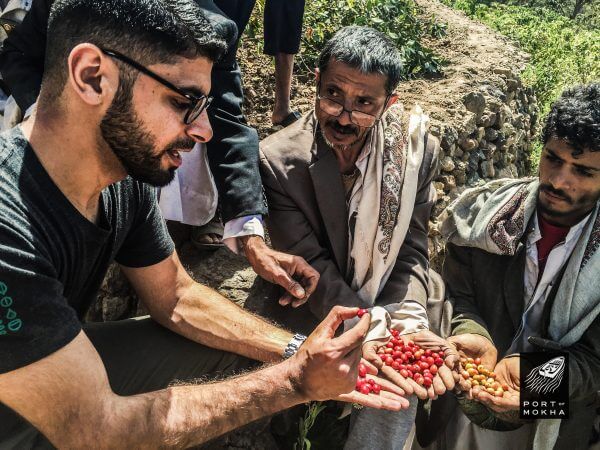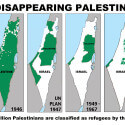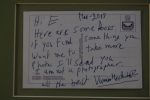One man’s mission to revive Yemeni coffee for global markets during the war.
By: Kerning Cultures

Mokhtar grew up between the United States and Yemen. In his grandparents’ garden in Yemen, Mokhtar picked red coffee berries off the trees and laid them out on drying beds. His grandmother taught him when to harvest the berries, and, later, how to brew coffee with spices like cardamom and saffron.
This early affinity with coffee stuck: years later, as Mokhtar began college in California, he spent most of his time going to specialty coffee shops and taking coffee classes. As he immersed himself in California’s specialty coffee scene, he noticed there was a lack of Yemeni coffee representation. He began reading reports on Yemeni coffee production and supply chain plans, and in 2013 decided he had to see it for himself.
Mokhtar visited 32 different regions in Yemen, spoke with coffee farmers and took coffee samples from each location. After several months, he tested the quality of the samples. In coffee, there is a method called “cupping” to assess the quality of a bean, on a scale of 100 points. 80 and above is considered specialty coffee, 85 is difficult to get, and 90 is near impossible and denotes extremely rare coffee. Of the samples Mokhtar cupped, the majority did not even meet basic specialty coffee standards. But two samples, from Ibb and Haima regions, ranked 90+. He knew he had something to work with. Over the next year and a half, Mokhtar went back and forth between the United States and Yemen, training his coffee farmers to consistently harvest quality coffee.
After a year and a half, he felt ready to showcase his coffee to the world. The Speciality Coffee Association of America (SCAA) was hosting a conference in Seattle in April 2015, and Mokhtar planned to debut his coffee there. But two days before Mokhtar was meant to fly out from Sanaa, the capital of Yemen, airstrikes rained down. A political crisis had been brewing in the country for quite some time, a conflict between the Yemeni government and rebel Houthi groups for power. This conflict erupted on March 25, 2015 with airstrikes forcing closure to civilian airports and ports.
Mokhtar was determined to make it to the SCAA conference in Seattle. Since planes were no longer an option, Mokhtar grabbed 60 kilograms of coffee samples in two suitcases and drove seven hours to an old, vacant port – the port of Mokha. Mokha was the first port in the world to trade coffee. He initially planned to take a large ship across to the closest next country’s working airport, but when he arrived in Mokha, he was informed the ship didn’t have enough diesel.
There was one other option: a small, fiberglass boat to Djibouti. The trip would take one day across the Red Sea. He paid the captain $900 and climbed into the boat.
“You’re in this giant ocean, and these waves [are] crashing on you… and this guy has no GPS. You don’t know if he knows where he’s going. And he has one single motor engine. If it dies, you’re done. Stuck,” remembers Mokhtar.
The trip was cold and wet. Mokhtar was numb for most it. But after 100 miles and a day’s journey, they arrived safely in Obock, a port in Djibouti. He was detained by authorities for a day and a half, released, and managed to fly out to Kenya. From there, Amsterdam, and finally onwards to his hometown of San Francisco. He stayed one night, and continued on to Seattle, with two days left to roast his coffee and prepare for the SCAA conference.
It was the most well attended event in the history of the SCAA. Mokhtar’s coffee, Port of Mokha coffee, performed extremely well in all blind cuppings. Buyers in attendance were eagerly offering some of the highest prices for coffee. As an example, Blue Bottle sells Port of Mokha coffee for $16 a cup of black coffee.
Today, the Yemeni war continues to rage on, making it difficult to grow and export coffee. But Port of Mokha manages, and Mokhtar is able to pay his coffee farmers some of the highest wages during the war. And every cup of Port of Mokha coffee ordered comes with Mokhtar’s story, and the story of Yemen’s deep history in coffee.
Episode Credits
Produced by Hebah Fisher and Percia Verlin, with editorial support by Razan Alzayani. Special thanks to Samira Pakmehr for transcription and research, and to Mohamed Khreizat for sound design.
This story was originally featured on Kerning Cultures.


- Israelisnipers shooting and killing hospital workers in Gaza - December 11, 2023
- CAIR Condemns Israeli Executions of Wounded, Unarmed Palestinian in West Bank - December 11, 2023
- Arab and Muslim American voters face a “simple choice” between Biden’s inhumanity and Trump’s edgy politics - December 9, 2023





















